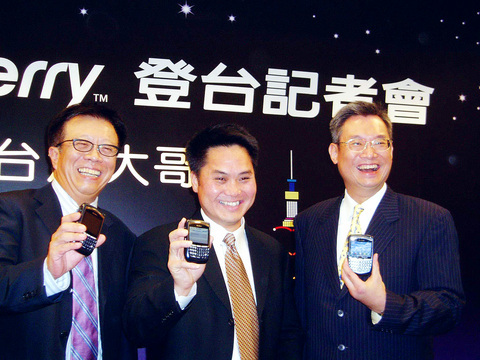Taiwan Mobile Co (台灣大哥大) yesterday said it planned to launch BlackBerry phones in Taiwan by the end of this month at the earliest to boost revenue, making it the first local telecom company to offer the red-hot wireless device in Taiwan.
The nation's third-largest mobile service operator said about 160 companies including Citi Group are interested in purchasing BlackBerry phones -- as its push-mail service would enable their executives to access e-mails on the go.
Bigger rival Chunghwa Telecom Co (中華電信) is also interested in offering BlackBerry handsets, but Research In Motion (RIM), the company behind BlackBerry, said it was not in talks with any other Taiwanese companies to launch its products.

PHOTO: WANG YI-HUNG, TAIPEI TIMES
"We are working solely with Taiwan Mobile and we are not working with anybody else" in Taiwan, said Norm Lo (勞偉強), the vice president of RIM's Asia Pacific branch, in a press conference in Taipei.
Taiwan Mobile said the popular mobile device would help it increase its corporate customer base and drive average revenues per user (ARPU) in the long run.
"The BlackBerry is appealing to corporate users, which are high ARPU customers," said Benny Chen (
Taiwan Mobile's ARPU were about NT$800 in the second quarter.
"Taiwan Mobile is making every effort to boost data usage amid falling charges for voice calls. Selling BlackBerry handsets should have a positive impact on Taiwan Mobile's ARPU," said a telecom analyst with KGI Securities (中信證券) on condition of anonymity.
But, the analyst said he did not expect to see a significant improvement in revenue following the launch, as corporate users only make up a small portion of the mobile operator's 5.29 million subscribers.
Corporate users currently make up less than 10 percent of the telecom operator's total revenues, according to Taiwan Mobile's Chen.
Adding two BlackBerry mobile phones to its product line-up, Taiwan Mobile aims to sell about 20,000 BlackBerry handsets plus new mobile numbers within the first year of the launch, said Jerry Feng (
Before the launch, Taiwan Mobile will need approval from the nation's telecom regulator, the National Communications Commission (NCC), about its rate plans. The NCC said it would take at least three weeks to finish the review.
Taiwan Mobile, which submitted its rate packages to the NCC last week, has signed an agreement with RIM to offer two BlackBerry handsets, the 7290 and 8700g at a minimum charge of NT$500 per month and a flat rate of between NT$1,500 and NT$2,000.
RIM sells its BlackBerry phones to about 200 telecom operators in about 60 countries around the globe and more than 100 other telecom operators are lining up for talks with RIM to secure a deal to distribute the phones.
Separately, Taiwan Mobile said the company was also in talks with Quanta Computer Inc (

Intel Corp chief executive officer Lip-Bu Tan (陳立武) is expected to meet with Taiwanese suppliers next month in conjunction with the opening of the Computex Taipei trade show, supply chain sources said on Monday. The visit, the first for Tan to Taiwan since assuming his new post last month, would be aimed at enhancing Intel’s ties with suppliers in Taiwan as he attempts to help turn around the struggling US chipmaker, the sources said. Tan is to hold a banquet to celebrate Intel’s 40-year presence in Taiwan before Computex opens on May 20 and invite dozens of Taiwanese suppliers to exchange views

Application-specific integrated circuit designer Faraday Technology Corp (智原) yesterday said that although revenue this quarter would decline 30 percent from last quarter, it retained its full-year forecast of revenue growth of 100 percent. The company attributed the quarterly drop to a slowdown in customers’ production of chips using Faraday’s advanced packaging technology. The company is still confident about its revenue growth this year, given its strong “design-win” — or the projects it won to help customers design their chips, Faraday president Steve Wang (王國雍) told an online earnings conference. “The design-win this year is better than we expected. We believe we will win

Power supply and electronic components maker Delta Electronics Inc (台達電) yesterday said it plans to ship its new 1 megawatt charging systems for electric trucks and buses in the first half of next year at the earliest. The new charging piles, which deliver up to 1 megawatt of charging power, are designed for heavy-duty electric vehicles, and support a maximum current of 1,500 amperes and output of 1,250 volts, Delta said in a news release. “If everything goes smoothly, we could begin shipping those new charging systems as early as in the first half of next year,” a company official said. The new

Quanta Computer Inc (廣達) chairman Barry Lam (林百里) is expected to share his views about the artificial intelligence (AI) industry’s prospects during his speech at the company’s 37th anniversary ceremony, as AI servers have become a new growth engine for the equipment manufacturing service provider. Lam’s speech is much anticipated, as Quanta has risen as one of the world’s major AI server suppliers. The company reported a 30 percent year-on-year growth in consolidated revenue to NT$1.41 trillion (US$43.35 billion) last year, thanks to fast-growing demand for servers, especially those with AI capabilities. The company told investors in November last year that